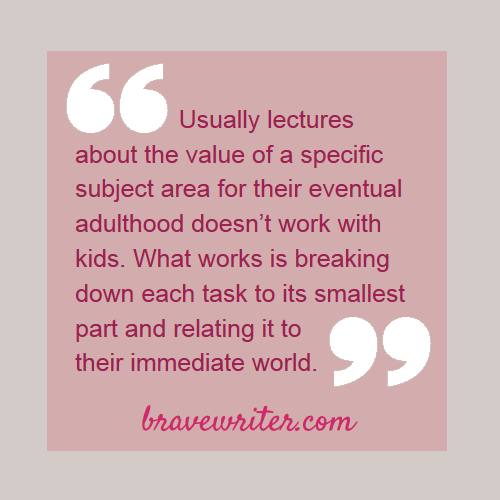What’s on your child’s mind?
Your kids have been pondering, thinking, and imagining their lives. Some of them spend hours daydreaming about the next level they’ll beat on a video game.
Others wish they could sew costumes or paint with watercolors. You might have a child who wants to be in a play or who wants to play an instrument.
Maybe your daughter wants to become the next soccer star of her local team and your son hopes he can take a cake decorating class.
A teen might want to spend hours a day watching the top 100 films listed by Criterion in order.
How will you know, if you don’t ask? Where will those hours of the day come from if they’re already filled with your agenda or your wishes?
Creating space for the pursuit of your children’s daydreams is one of the greatest joys of homeschool. When you care about their desire to beat the next level on a game, they are more likely to trust you when you say that the math page will only take 15 minutes.
Conversely, what if dread of a specific homeschool task fills their minds?
Find out about that. Create space for complaint or anxiety.
In some cases, your kids will have smart thoughts about how to learn the hard subject area. It’s surprising the amount of insight your kids may have about their struggles if you know how to ask them the right kinds of questions.
You might ask things like:
“I know times tables feel hard to do. Does anything help? Do you prefer to hold things in your hand or draw on a chalk board? Does it help to talk to me as you work on them? What’s the hard part for you? Is it the book? Too busy and colorful? Too plain and tedious? Do the Cuisenaire rods hurt or help?”
Don’t punch the questions at your child like a nail gun. Take them slowly, show curiosity. Sometimes a child will say one thing that unlocks the whole thing:
“I don’t get the point of the rods.”
Suddenly you can see that your child is going through the motions without true understanding! More modeling and support, conversation and suggestions can follow. So pay attention and use your maturity and compassion to help you hear where the frustration comes from.
Usually lectures about the value of a specific subject area for their eventual adulthood doesn’t work with kids. What works is breaking down each task to its smallest part and relating it to their immediate world.
If there is no immediate connection, perhaps the work should fall to you to discover one before requiring a child to work that hard on the subject. After all, these are children. They don’t have the same level of fortitude to “do what they should” as you do as an adult. So take time (since you are the grown-up) to find the connection, to uncover the meaning, and to share it with love and support before requiring follow through and effort.
Sandwiched between support for their dreams and help for their struggles are love and trust. Create those through curiosity and care, and you’ll all feel a little happier today.
Cross-posted on facebook.


















